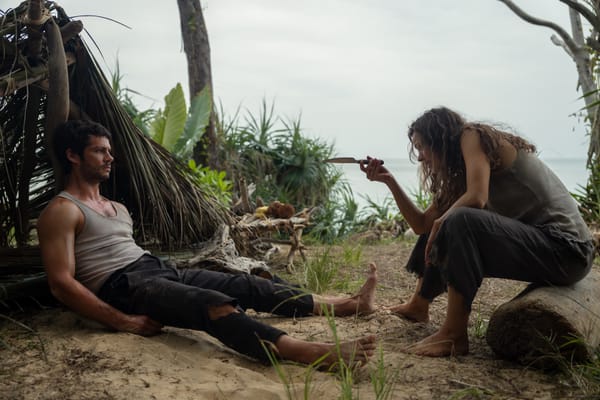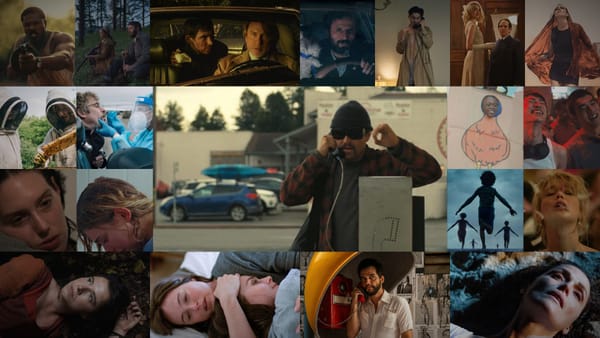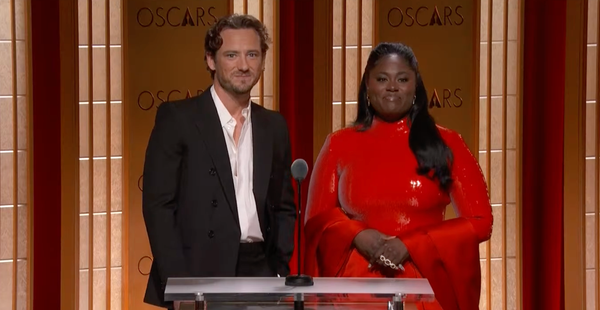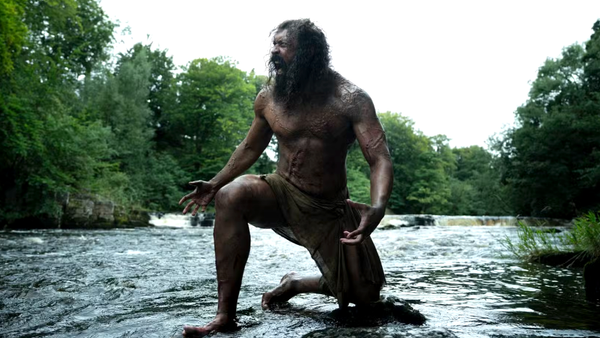‘F1 The Movie’ Is a Long Car Commercial and Also One of the Greatest IMAX Experiences Ever
Plus: A few thoughts on 28 'Years Later.'
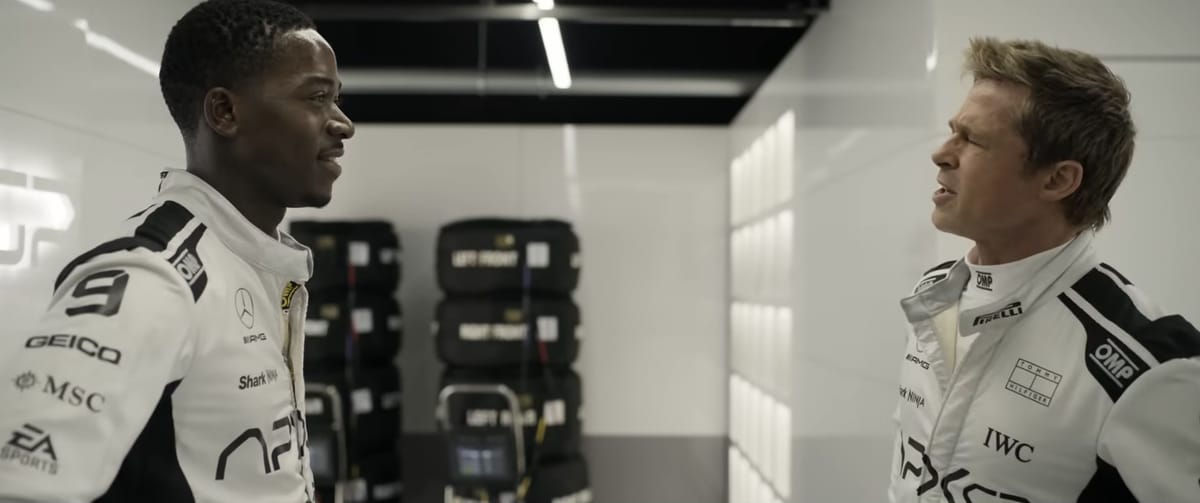
The time has come for me to recommend a Joseph Kosinski-directed film featuring one of our last big movie stars with a plot about a brash-but-washed-up old timer coming into a storied institution and teaching some rookies that maybe there was wisdom to the old ways of doing things. All the while, one of the main selling points of the film is that the filmmakers managed to fit high-quality film cameras into a fast moving vehicle to immerse you in the action and provide you a sense of speed that was previously thought physically impossible.
But enough about Top Gun: Maverick, folks.
If I kid, it’s because I love: F1: The Movie is a thoroughly enjoyable sports movie featuring some of the most visually spectacular racing sequences ever put to film. And yet: one can’t help but shake the feeling that everything you’re seeing has been carefully calibrated to sell you stuff, whether it be the litany of car brands and sponsors on display (the protagonists are part of the Expensify APX GP F1 team and they make sure to show you the full name as often as possible), or the visual sheen of flawlessness that’s become characteristic of Kosinski’s work. Still, few other films this year will give you the simple pleasures of an extremely basic underdog sports movie plot coupled with the technical wizardry on display here.
The story revolves around Sunny Hayes (Brad Pitt), a washed up and itinerant race car driver who is given the opportunity by an old friend, Ruben (Javier Bardem), to be a driver on his failing Formula One team, APXGP. Ruben’s goals are simple: Win a single race in the following year, or else lose control of APXGP. Along the way, Hayes needs to deal with an exceptionally skeptical rookie driver (Damson Idris) and an equally skeptical (but possible love interest?) technical director (Kerry Condon). There’s nothing wrong with the story but there’s also nothing that elevates it. The details are basic, the characters have decent chemistry with each other, and many of the major beats are entirely predictable.
Where the movie really shines are its racing scenes. Pitt and Idris learned how to drive real F2 cars and Kosinski and team developed new camera systems to fit high-quality sensors into the cockpit of those vehicles. The result is a level of immersion one rarely experiences in the theater. It becomes easy to believe that these characters are actually in peril, driving at speeds in defiance of the Lord’s will and trying to dodge other cars and race obstacles along the way. I watched the movie on a conventional IMAX screen (AKA LIEMAX) and the whole film filled the entire 1.9:1 aspect ratio screen with razor sharp clarity. I don’t know how to describe it other than that it’s one of the most impressive IMAX experiences I’ve ever had.
There are a few elements of the film that do distract. Sometimes, F1 explains too much and sometimes not enough; the races feature some loud and irritating sports commentating that explicitly lays out what’s going on, yet many of the more plot-critical rules aren’t adequately explained. The deification of everything F1-related, from the science/tech to the glory of victory on the race track, start to grate after awhile. This movie was obviously made to not only make Apple into a credible artistic force but also to increase the popularity of Formula 1. Time will tell whether it succeeds.
But at the end of the day, F1 delivers on what you’d expect: Fast cars, beautiful people, fun times. It’s hard to ask for anything more in a summer movie season.
F1 the Movie is out in theaters everywhere today.
I Did Not Love ‘28 Years Later’
I’m crushed to report that I was not a huge fan of Danny Boyle’s 28 Years Later.
The idea of Boyle and writing partner Alex Garland returning to this franchise is an exciting one. 28 Days Later helped popularize the idea of “fast zombies” and showed us a vision of the post-apocalypse that has hugely influential. What would Boyle and Garland have to add to the genre at this moment?
28 Years Later begins promisingly, with a father-son duo (Aaron Taylor-Johnson and Alfie Williams, respectively) leaving the safety of an isolated island on an initiation ritual of sorts. The first hour of the film is thrilling, with a handful of action set pieces that are unbearably tense. While out in the world, we see how Britain has evolved in the decades after the outbreak, with new variants of infected and nature reclaiming its place over the remnants of human civilization. It’s a gorgeous film that captures the beauty of the UK countryside, made even more impressive when you consider that a big portion of it was shot using iPhones.
But the first act gives way to characters making a bunch of silly decisions that strain credulity, plot developments that feel clunky and cliche, as well as an ending that will probably be one of the most polarizing for any film this year. I’ve read up on how the film is a Brexit allegory and I understand many of its references. But just because one understands a film and what it’s trying to do doesn’t necessarily make it enjoyable.
Despite all this, in my estimation, Boyle remains one of the greatest filmmakers alive and his use of techniques like this iPhone rig continue to push the medium of cinema forward in exciting ways. I’m glad he’s still making films and his work remains vital. 28 Years Later is the first in a planned trilogy of films, with its sequel, 28 Years Later: The Bone Temple, currently planned for release in January 2026. Perhaps when I can experience the story in its entirety, my feelings on this entry will change.
28 Years Later is currently in theaters everywhere.
Other Stuff David Chen Has Made
- If you want to hear more of my thoughts on 28 Years Later, check out the Filmcast review of it.
If you’re not subscribed to the (free) Decoding TV newsletter, I’d strongly recommend it. We’ll have recaps and reviews of Ironheart and Squid Game in the days to come, plus Alien Earth and more later this summer. Here’s Dan Gvozden’s review of the Ironheart premiere.
Ironheart S1E01-03 Review | "Take Me Home," "Will the Real Natalie Please Stand Up?" "We in Danger, Girl"[Welcome to Decoding TV’s coverage of Ironheart Season 1! For each of Ironheart’s two 3-episode drops, we’ll be running…On the Decoding TV podcast, Patrick Klepek and I also covered Ironheart. While the show is not a disaster, it’s not great!

